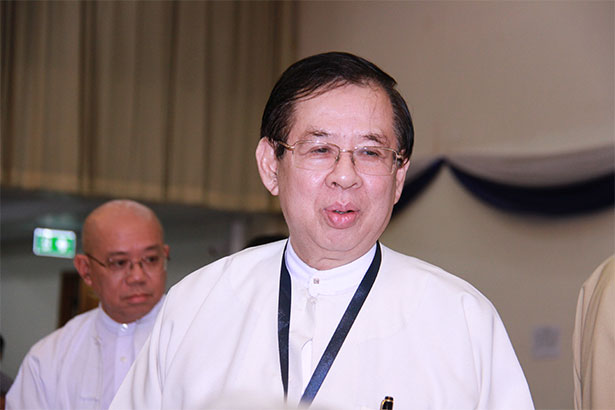Name : Zaw Min Win
Position : President of UMFCCI
[paypal]
Please explain about UMFCCI.
It was first founded as Burmese Chamber of Commerce (BCC) in 1919, during the colonial days, the same year the International Chamber of Commerce was founded in Paris, France. It ceased to function between 1962 and 1988 the socialist era.
After the takeover of the government by the new military regime in 1988, it was reactivated and established as the Union of Myanmar Chamber of Commerce and Industry in conformity with the government’s proclamation of its new market oriented economic policy. It was further reformed and upgraded into a federation in 1999 and continues to function to this day as the Union of Myanmar Federation of Chamber of Commerce and Industry. UMFCCI is a national apex, nonprofit making NGO, representing and promoting the private business sector. It acts as a bridge between the state and this sector and also as its representative voice. There are over 38,000 corporate members and 76 affiliated associations based on different industries, trades and services under its umbrella. It is a core member of regional organizations such as ASEAN BAC, EABC, GMSBC and various others and cooperates actively with them in regional development activities. It has signed more than 180 MoUs of Cooperation with overseas chambers and business organizations and interacts with them for business promotion and development.
How did you end up in your current position?
I am one of the old veterans of the Chamber, joining the UMFCCI in 1989 as an Executive Committee Member and continued to serve as Joint Secretary General from 1990 to 1998. I served as Secretary General from 1999 to till 2014. Then I continued to serve as Vice President till 2016. I was nominated and elected as President in the Election of UMFCCI and assumed this position in the Annual General Meeting on October 30, 2016.
Please tell about your duties and responsibilities.
My main responsibility is to harness the capacity and cooperation of our Executive Committee and strive for the successful implementation of the objectives of UMFCCI, which are to promote the harmonious operations of the private sector businesses in conformity with the state’s market oriented economic policy, contributing towards Myanmar’s prosperous economic development, and well-being of our country men. In this regard I extend my leadership role to establish and perpetuate cordial relationship with our regional countries, trading partners and well-wishers.
What is your view on in-fighting within UMFCCI especially at AGM time?
In any civilized society or organization or association group, there are naturally, diverse and competing interests, arising from wants and needs of individual (personal) or association group. All these diverse interests have to be analyzed with a view to commonly acceptable and feasible interests and suggestion or ideas which could be representable, acceptable and shareable by all. Such interest aggregation process has to be done systematically based on facts and principles. That is the positive way to bring about the different and diverse points of view and interests. During my term, I am able to maintain harmony and cooperation among the executive committee members, building up organizations unity and strength.
How do you ensure business opportunities presented at UMFCCI CEC level reach to members?
UMFCCI disseminates its activities through its network of e-mails, website presentation, newsletter publication and other activities such as business meeting, matchings, Entrepreneurial and Staff Capacity and Skill building seminars and others. We do not conceal any business opportunity in any way what so ever.
What are the major contributions of UMFCCI to the overall economic development of Myanmar?
Private sectors contribution to GDP is more than 90% and UMFCCI has successes in organizing this sector to be recognized by the state as the engine of growth of the national economy. We interact with the international business community to actively promote trade and investment for the economic development of Myanmar. Several consultation meetings took place between Government and private representatives since 2016 December to remove the barriers or difficulties that harden the free flow of trade and investments with a view to create more job opportunities, more income alleviation of poverty and economic development.
Please name three achievements that you are most proud of at UMFCCI. UMFCCI, apart from its various achievements is most proud of the followings.
- Establishing a firm channel of Government-private partnership cooperation. Being able to organize the monthly meetings in its premises headed by His Excellency Vice President (1) along with the Chief Minister of Yangon Region and other Union Ministers to listen to grievances and suggestions of the private sector and find positive solutions.
- Being able to build trust, unity and strong cooperation between Government, UMFCCI and the business community.
- In contributing towards educating and promoting capacity building training in various business related sectors and most of all in successfully organizing the offshore MBA program in cooperation with the University of Thai Chamber of Commerce.
What is your opinion on current e c o n o m i c c o n d i t i o n s a n d SME development under NLD Government?
The NLD government is doing its best to rectify the debacles suffered by the country through five decades of centrally controlled totalitarian military led administration. Its more activated market oriented economic policies, enactment of new laws rules and regulations ushering in overseas investment, greater participation of local investors are making positive contributions towards economic development which in the eyes of some seems to be sluggish. But in the eyes of bilateral and multilateral financing agencies such as World bank IMF, ADB, ODA of Japan and others, Myanmar is considered to be treading the right path. The reform processes under implementation need time for fruition and we are hopeful for a greater bright future.
The government’s initiative to promote and develop the SME sector under the leadership of State’s Union President, State Counsellor and State’s Vice President (1) is paving the way for developing this sector not only with the government’s support but also with support of overseas development partners.
From a business standpoint, what are the biggest challenges facing Myanmar businesses in next 1-3 years?
Most of Myanmar businesses have had their free play over these past decades. Adapting to current reforms and changes may be challenging. When AEC is in place, our businesses will face formidable challenges from the more developed economics of ASEAN. There will be urgent need to develop quality, skills, technology and business culture to face the challenges over the 3 years as mentioned. If you could make one major changes to any government policy what would it be? I would strongly recommend and do my best to request the government to enact rules and regulations that will allow the businesses to function smoothly in an enabling environment.
[/paypal]










